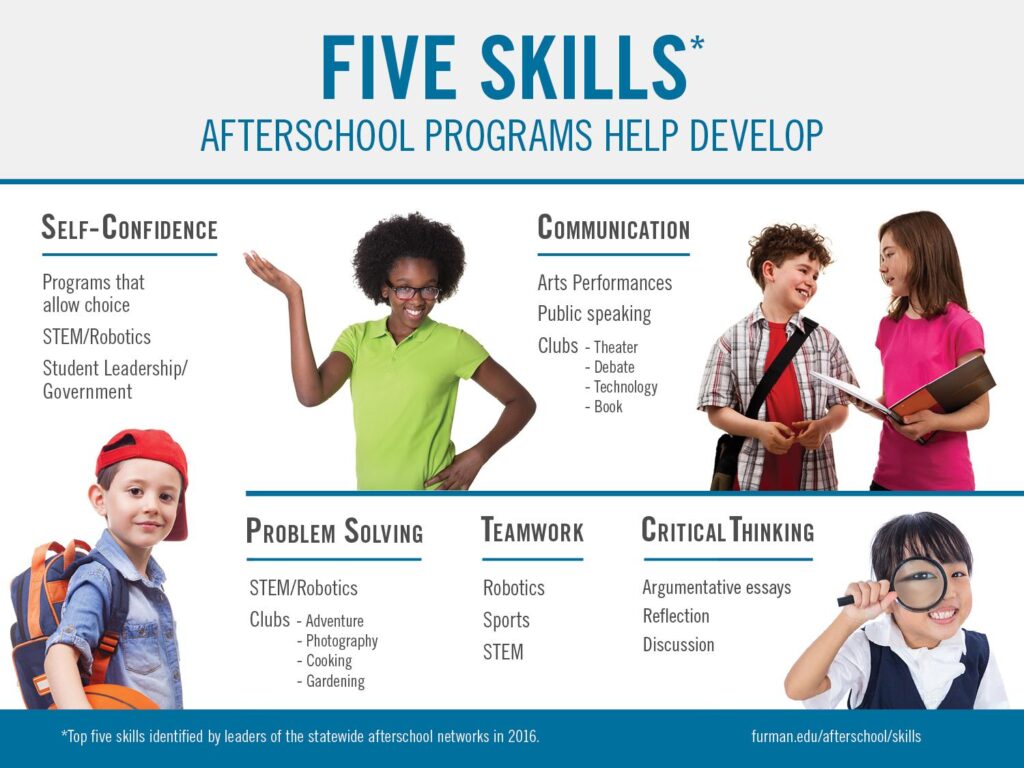Unlocking Potential: How After-School Programs Cultivate Vital Skills for Children’s Success
Empowering Growth Beyond the Classroom
As families increasingly look for ways to nurture their children’s development outside traditional school hours, after-school programs have become indispensable avenues for cultivating essential life skills. These initiatives not only boost academic achievement but also enhance creativity, social interaction, and emotional intelligence—key factors that contribute to a child’s long-term success. This article delves into some of the most effective after-school activities and their role in equipping young learners for future challenges.
Essential Life Skills Fostered by Leading After-School Programs
Selecting the ideal extracurricular activities can profoundly influence a child’s personal and intellectual growth. Programs that emphasize critical thinking, collaboration, and communication lay the groundwork for lifelong achievement. For example, technology clubs encourage analytical problem-solving, theater groups build confidence and public speaking prowess, and athletic teams instill perseverance and teamwork. These experiences engage children meaningfully while nurturing qualities that will benefit them well into adulthood.
Here’s a breakdown of popular after-school options and the core competencies they develop:
| Activity Type | Developed Skills | Recommended Ages |
|---|---|---|
| STEM Workshops (Robotics, Coding) | Analytical Thinking, Innovation | 8-14 years |
| Team Sports (Basketball, Soccer) | Leadership, Cooperation | 6-16 years |
| Creative Arts (Painting, Music) | Self-Expression, Concentration | 5-15 years |
| Volunteer & Community Groups | Empathy, Accountability | 10-18 years |
By thoughtfully exploring these opportunities, parents provide their children with more than just pastimes—they offer a comprehensive skill set that prepares them to navigate complex real-world situations. This strategic investment fosters both academic excellence and personal resilience, essential for thriving in an ever-changing global landscape.
Preparing for the Future: The Impact of STEM Activities on Career Readiness
In today’s fast-paced economy, children who engage in STEM (Science, Technology, Engineering, and Mathematics) programs develop indispensable analytical and problem-solving skills. These activities transcend traditional learning by promoting hands-on experimentation, teamwork, and creative thinking, enabling young minds to adapt swiftly to technological advancements and multifaceted challenges. Moreover, STEM participation cultivates resilience and innovation—traits highly prized in the modern workforce.
Beyond technical knowledge, STEM programs enhance interpersonal skills such as communication and project coordination, which are critical in collaborative work environments. The table below outlines key competencies gained through popular STEM pursuits and their relevance to future employment sectors:
| STEM Activity | Skills Acquired | Career Advantages |
|---|---|---|
| Robotics |
|
Fields like AI, Automation, and Engineering |
| Coding Clubs |
|
Software Engineering, Cybersecurity, Data Analytics |
| Scientific Exploration |
|
Healthcare, Environmental Science, Technology Research |
How Arts and Athletics Shape Holistic Development
Participation in artistic and athletic activities plays a pivotal role in fostering emotional intelligence and social competence. These programs nurture creativity, discipline, and perseverance, equipping children to face challenges both academically and personally. For instance, involvement in visual arts enhances problem-solving and empathy, while sports cultivate leadership and cooperative skills essential for future success.
Key life skills nurtured through arts and sports include:
- Effective interpersonal communication
- Team collaboration and mutual support
- Time management and goal-oriented behavior
- Flexibility and coping with stress
| Program Category | Primary Benefits | Long-Term Outcomes |
|---|---|---|
| Visual Arts | Boosted creativity and concentration | Enhanced innovation in academics and careers |
| Team Sports | Improved physical health and teamwork | Development of leadership and social networks |
| Performing Arts | Increased confidence and public speaking skills | Better communication and self-expression |
Matching After-School Programs to Your Child’s Passions and Strengths
Choosing after-school activities that resonate with your child’s interests and innate abilities is crucial for maximizing engagement and fostering a lifelong love of learning. For example, a child fascinated by storytelling might flourish in drama clubs, while one with a penchant for numbers could excel in math or coding workshops. Observing your child’s preferences and strengths can guide you toward programs that offer the most meaningful and rewarding experiences.
Recognizing and nurturing your child’s talents not only reinforces existing skills but also lays a foundation for future achievements. Creative pursuits like music or painting enhance emotional awareness and fine motor skills, whereas sports promote communication and leadership. The table below offers a quick guide to pairing interests with suitable programs and their benefits:
| Interest Area | Recommended Programs | Core Advantages |
|---|---|---|
| Technology & Science | Robotics, Coding Workshops | Analytical Thinking, Problem Solving |
| Creative Arts | Painting, Music Classes | Creativity, Emotional Expression |
| Physical Activities | Soccer, Martial Arts | Teamwork, Discipline |
| Communication & Languages | Debate Club, Language Learning | Confidence, Verbal Skills |
- Customize activities to unlock your child’s full potential.
- Promote exploration to uncover hidden talents.
- Balance enjoyment and skill development for sustained motivation.
Final Thoughts
In a world where competition and complexity continue to rise, after-school programs offer more than supervision—they provide critical opportunities for children to acquire skills that will shape their futures. Both parents and educators should view these programs as strategic investments in a child’s holistic development, laying the groundwork for lifelong achievement. As educational paradigms shift, these initiatives remain essential in preparing young people to confidently and competently face the demands of tomorrow’s world.













